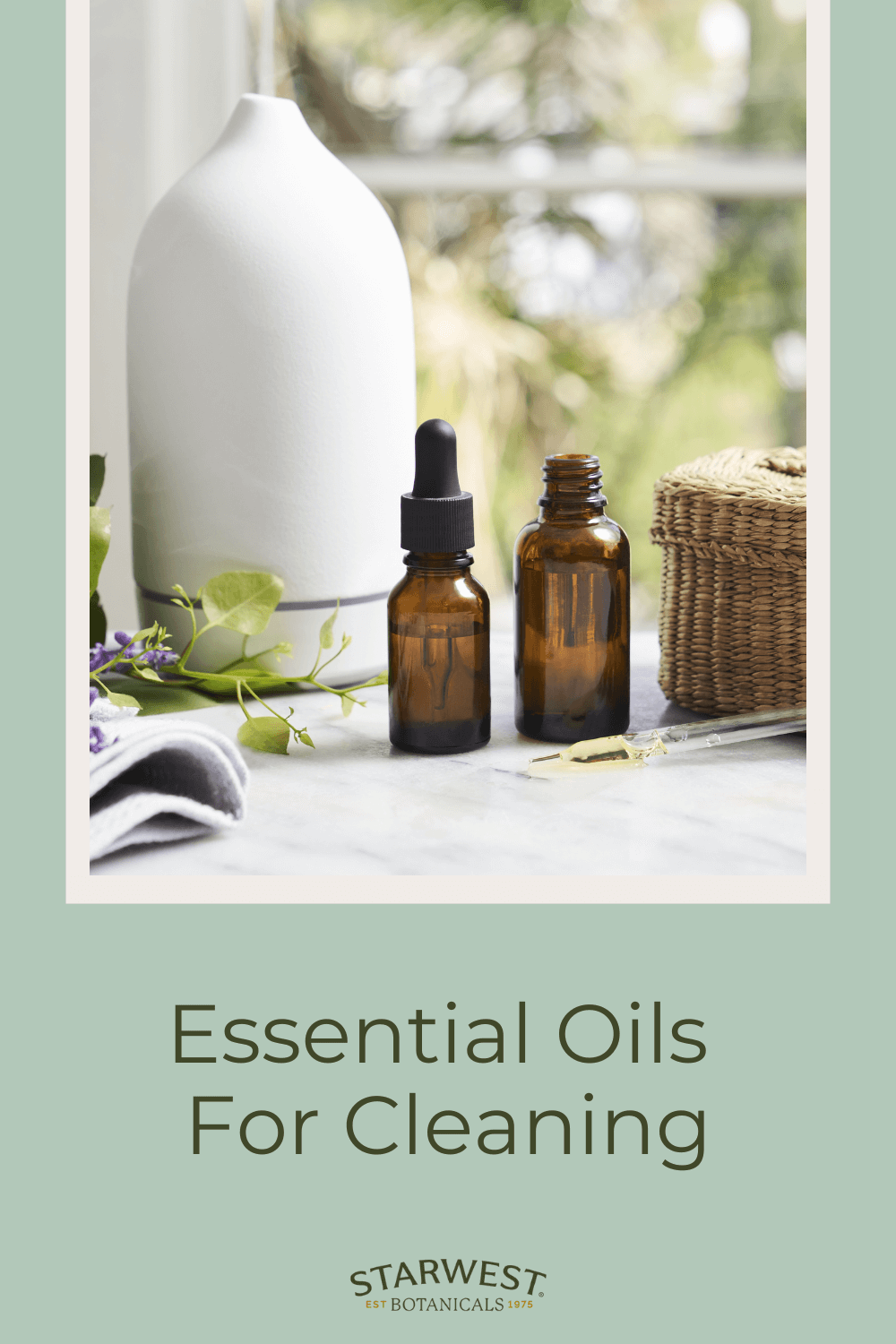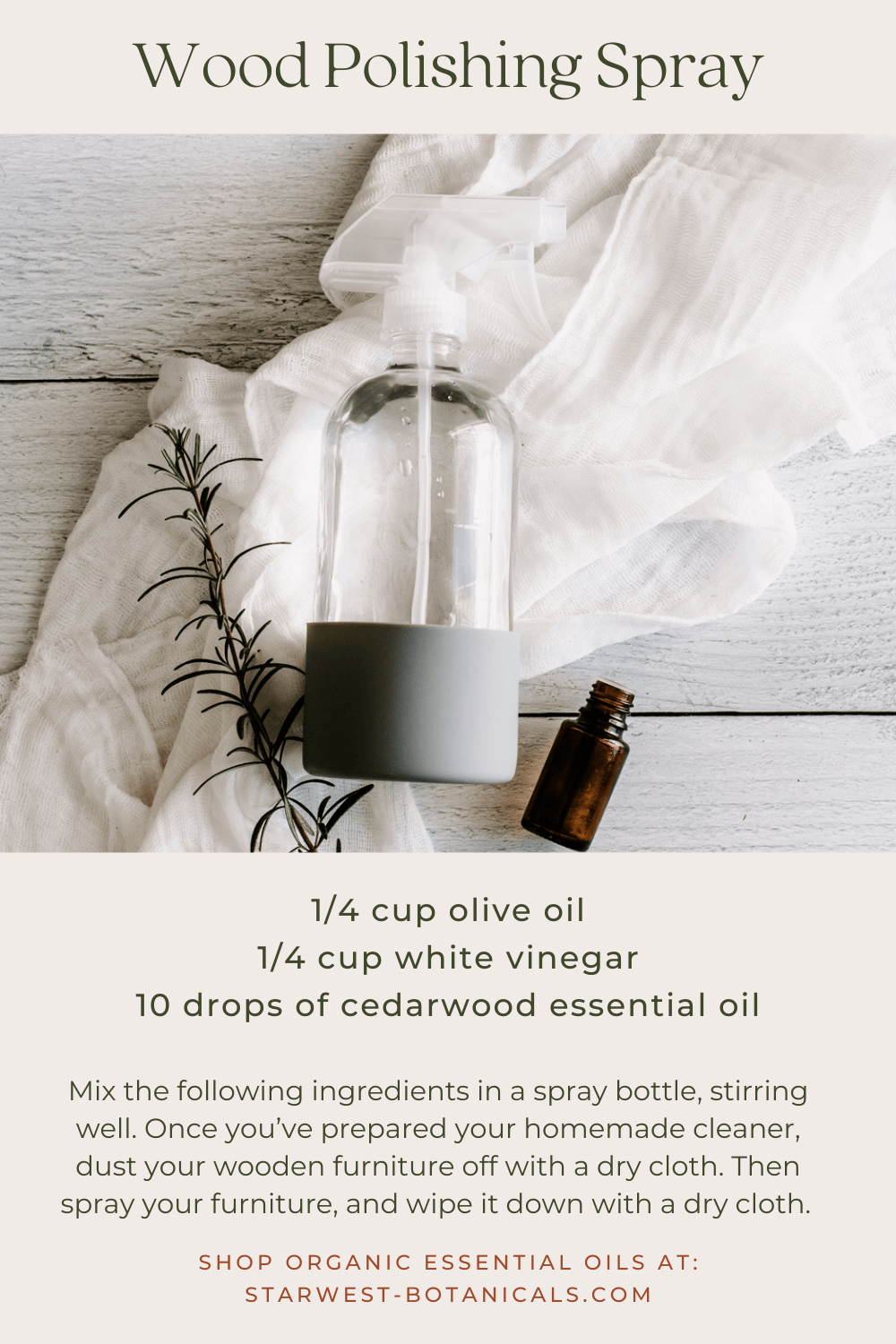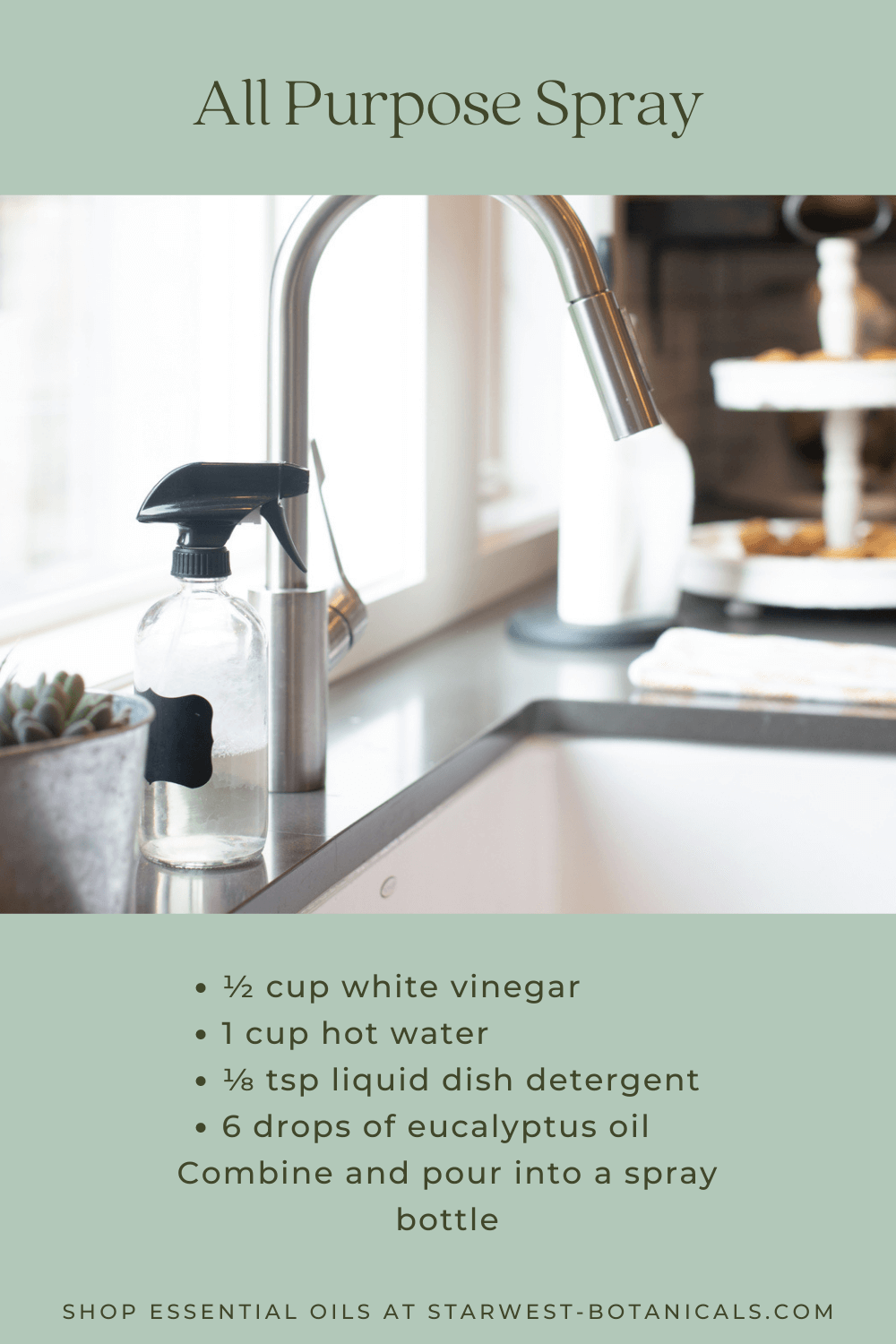8 Essential Oils for Cleaning | Starwest Botanicals
Posted by Starwest Botanicals on 11-15-2022

8 Essential Oils for Cleaning
If you’ve ever stood in the grocery store cleaning aisle and felt frustrated by the lack of natural cleaning products, you’re not alone. About 17% of shoppers in the U.S. search for more natural options when buying laundry and cleaning products. Which makes sense—it’s your home. Of course you want safe, holistic, natural cleaning products.
In pursuit of more natural options, some people choose to use essential oils for cleaning and disinfecting their home. However, different essential oils have different properties. Understanding those properties can help you choose the essential oils that best fit your cleaning needs.
We rounded up the best essential oils for cleaning to help you create the sparkling fresh natural home of your dreams.
Using Essential Oils for Cleaning
Essential oils are highly concentrated oils made from a specific plant. That means well-made essential oils can often have some of the useful properties of the plant they’re made from. Using essential oils in your cleaning routine can help you avoid the harsh chemicals often found in traditional cleaning products.
You can use different essential oils for:
- Their ability to lift stains from dirty laundry and furniture
- Their wood polishing properties
- Their pleasant scent
With the variety of ways to use essential oils, it's important to always follow any dilution instructions on the packaging. Additionally, if a member of your household has an allergy to a specific plant, it’s typically best to avoid any essential oils derived from that plant.
Used properly, however, essential oils can prove a simple, welcome alternative to the harsher cleaning products you might find at your local grocery store. Let’s examine 8 essential oils you can incorporate into your cleaning routine.
1. Cedarwood Essential Oil
Cedarwood essential oil can work wonders for polishing wood furniture. It has a rich, sweet-balsamic, woody fragrance that can help you craft a signature scent that positively sings home.
Here’s one popular recipe for making your own wood polishing spray:
- ¼ cup olive oil
- ¼ cup white vinegar
- 10 drops of cedarwood oil
Mix the following ingredients in a spray bottle, stirring well. Once you’ve prepared your homemade cleaner, dust your wooden furniture off with a dry cloth. Then spray your furniture, and wipe it down with a dry cloth. To keep your gorgeous wood furniture gleaming, try to polish your furniture about once every two to three months.
If you love the idea of DIY wood polishing spray but want an alternative to cedarwood, keep reading. We’ll cover other essential oils that you could also use to care for the wooden furniture pieces in your home.

2. Eucalyptus Essential Oil
Derived from the dried leaves of eucalyptus trees, eucalyptus essential oil can be used to remove certain stains, as well as used as an ingredient in all-purpose cleaners.
You can use eucalyptus oil to help remove stains from:
- Clothing – You can try adding a few drops of eucalyptus oil to your regular laundry detergent to give your clothing a refreshing scent. You can also try soaking stained clothing in eucalyptus oil to remove stains, but it’s important to double-check the fabric type and care instructions on your clothing first. To ensure the oil will help—not hurt—your clothing, you may want to first perform a patch test in an unnoticeable area.
- Carpet – To spot clean a stain on your carpet, try dampening a cloth with eucalyptus oil and wiping gently at the stain.
- Leather – If a stray pen left a mark on a leather surface in your home, try rubbing it off with a small amount of eucalyptus oil.
It’s important to note that different materials and fabrics can react differently to various cleaning treatments, so try to test your eucalyptus oil on a less noticeable part of the material first. If it dries without leaving a mark, it’s safe to apply to more prominently placed stains on your furniture and clothes.
Eucalyptus also works well as part of an all-purpose cleaner for wiping down countertops and other non-wooden surfaces throughout your home.
Here’s how to make eucalyptus homemade cleaner:
- Combine ½ cup white vinegar, 1 cup hot water, ⅛ tsp liquid dish detergent, and 6 drops of eucalyptus oil in a bowl.
- Mix well.
- Pour the cleaning mixture into a spray bottle, shaking thoroughly before each use.
For a more concentrated eucalyptus cleaning spray that’s designed to fight grease and grime, try filling a spray bottle with water, then adding two teaspoons of eucalyptus oil and one teaspoon of dish soap.
However you choose to use it, eucalyptus oil offers a fresh, medicinal, woody aroma that can leave your laundry (and
anything else you clean) smelling positively refreshing.

3. Lavender Essential Oil
If you fantasize about escaping to the lavender fields of Provence, this is the essential oil for you. Derived from lavender flowers, lavender essential oil has a sweet, floral, herbal scent that can feel both clean and soothing.
To incorporate it into your cleaning routine, try creating the wood polishing spray we mentioned above, but when it comes time to add the essential oil, use ten drops of lavender essential oil instead of cedar oil.
You can also add a few drops of lavender oil to an aroma mist diffuser to create a relaxing and soothing ambiance in your home.
4. Lemongrass Essential Oil
Also known as cymbopogon flexuosus, lemongrass is a tropical grass with a scent reminiscent of lemons.Lemongrass essential oil has an earthy, fresh, grassy-citrus scent that, when added to household cleaners, can help your home smell as fresh and lovely as a bowl full of lemons on the kitchen table.
You can make your own All-Purpose Cleaner by mixing the following ingredients:
- About 6 drops of lemongrass oil
- ½ cup white vinegar
- 1 cup hot water
- ⅛ tsp liquid dish detergent
Add your solution to a spray bottle, shake well, and use it to wipe down the non-porous surfaces in your home—like sinks, counters, and Formica tabletops.
5. Lemon Essential Oil
If you like the scent of lemongrass oil, you’ll love the scent of lemon essential oil. Derived from—you guessed it—lemons, this oil comes with a fresh, light, citrus oil scent. Imagine a richer, more concentrated version of the fragrance you smell when you hold a lemon peel to your nose.
Like lavender oil and cedarwood oil, ten drops of lemon oil added to a homemade wood polish or all-purpose cleaner can help keep your wooden furniture in tip-top condition.
6. Orange Sweet Essential Oil
Derived from the orange plant (formally known as citrus sinensis), orange sweet essential oil smells rich, sweet, and citrusy—a scent that’s equally perfect on warm summer days and long December nights.
Studies suggest that orange essential oil may reduce bacteria. If you’re hoping to find a natural cleaner free of toxic chemicals that can banish germs and keep your home smelling sweet at the same time, this could be an excellent option.
To try incorporating it into your cleaning routine, add ten drops of orange essential oil to your go-to DIY wood furniture polish recipe.
7. Pine Essential Oil
If you love breathing in the pine-drenched air when you’re hiking through the forest on a warm summer day, you might want to try incorporating pine needle essential oil into your cleaning routine. It has a strong, earthy, woody, balsamic, fresh scent that conjures up images of cozy libraries.
Like some of the other organic essential oils we’ve mentioned, pine oil can work wonders when added to your customized homemade furniture polish. If you like your wood furniture to smell less like lavender and more like, well, wood, we recommend giving pine essential oil a try.
Whether your wooden furniture is a precious family heirloom or a self-built triumph, you have plenty of essential oil options for keeping it gleaming, cared for, and smelling amazing.
8. Tea Tree Essential Oil
Derived from the leaves of the tea tree, tea tree essential oil is also known as melaleuca oil. It has a fresh, spicy, warm, camphoric, and slightly medicinal scent you might recognize if you use tea tree natural oils for skin care and body products.
Research suggests this oil has properties that can help fight certain pathogens.
To take advantage of tea tree oil’s potential beneficial properties, try making a cleaning solution by combining a few drops of tea tree oil with hot water, white vinegar, and liquid dish soap.
Keep Your Life Clean and Fresh with Starwest Botanicals Essential Oils
Now that you’ve discovered the many essential oils you can incorporate into your cleaning routine, let’s explore how to find and recognize high-quality essential oils. Try to follow these rules of thumb when shopping for essential oils:
- Look for 100% pure essential oils without any additives. Instead, try to find oils derived solely from the specific plant in question.
- Seek out essential oil companies that work with high-quality suppliers that prioritize ethical business practices.
- If you prefer to shop organic, look for USDA-certified organic essential oils.
Ultimately, a premium essential oil should combine high-grade ingredients with an effective derivation process so that the resulting oil retains the core aroma and properties of the original plant.
If you’re looking to explore what essential oils can bring to your home—and life—consider Starwest Botanicals. Founded in 1975, we’re a principal supplier in the natural products industry. We manufacture a rich variety of botanicals, spices, and herbs, with a special focus on offering our customers certified organic ingredients.
Start your journey toward a clean, natural home with Starwest Botanicals.
Sources:
Dose Response. Antibacterial Activity of Tris NaCl and PBS Buffer Protein Extract of Cassia fistula, Saccharum officinarum, Albizia lebbeck and Cymbopogon citrates Against Bacterial Strains.https://pubmed.ncbi.nlm.nih.gov/33628155/
Evidence Based Alternative Medicine. Antimicrobial Properties of Plant Essential Oils against Human Pathogens and Their Mode of Action: An Updated Review. https://www.ncbi.nlm.nih.gov/pmc/articles/PMC5206475/
First for Women. 10 Things You Should be Cleaning With Eucalyptus Oil. https://www.firstforwomen.com/posts/home/eucalyptus-oil-for-cleaning
The Miracle of Essential Oils. 5 Essential Oils for Cleaning Wood Furniture. https://www.themiracleofessentialoils.com/essential-oils-for-cleaning-wood-furniture/
Statista. Average annual expenditure on laundry and cleaning supplies per consumer unit in the United States from 2007 to 2020 (in U.S. dollars)*. https://www.statista.com/statistics/305499/us-expenditure-on-laundry-and-cleaning-supplies/
Stay at Home Mum. 3 Ways to Clean with Eucalyptus Oil. https://www.stayathomemum.com.au/houseandhome/diy-cleaning-products/cleaning-the-natural-way-eucalyptus-oil/
Cleveland Clinic. 11 Essential Oils: Their Benefits and How To Use Them. https://health.clevelandclinic.org/essential-oils-101-do-they-work-how-do-you-use-them/
Journal of Food Science. Inhibition of beef isolates of E. coli O157:H7 by orange oil at various temperatures. https://pubmed.ncbi.nlm.nih.gov/22583064/


